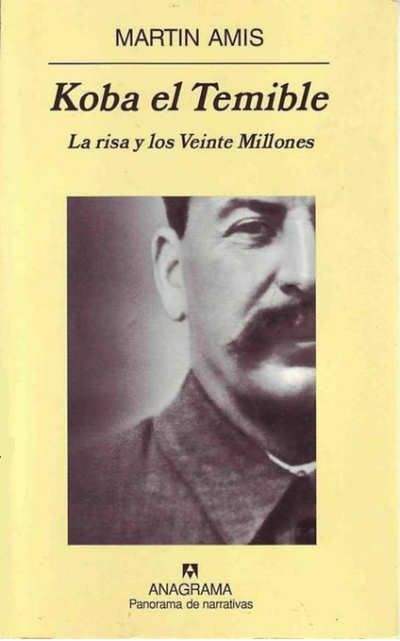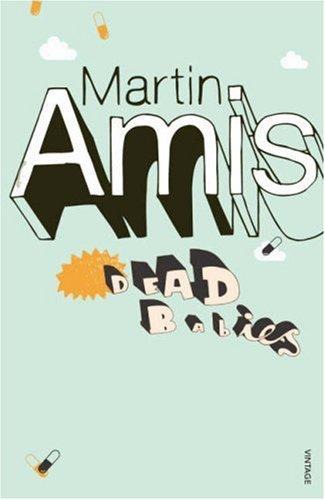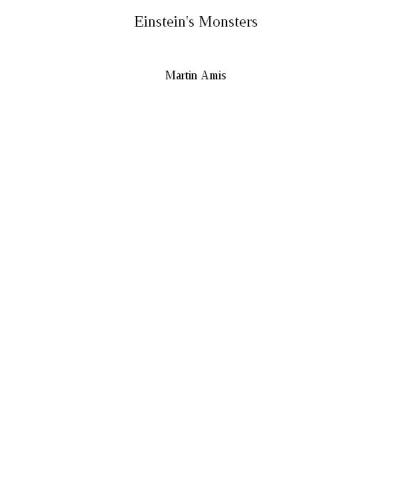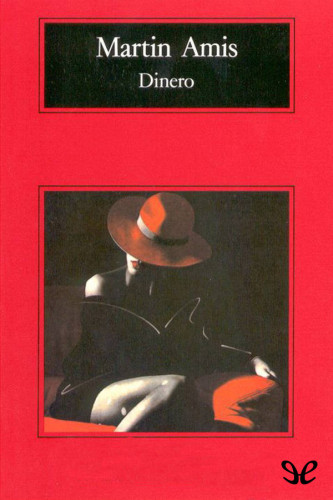oleebook.com
Einstein's Monsters de Amis, Martin
de Amis, Martin - Género: English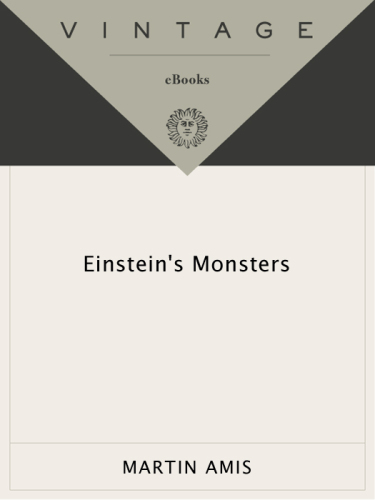
Sinopsis
A collection of stories about a frightening world inhabited by people dehumanized by the daily threat of nuclear war and postwar survivors deformed by its results.
From Publishers Weekly
"This collection of stories is prefaced with an essay on the nuclear threat so trenchant and irrefutable that the book is worth reading for that alone." The stories that follow are "all virtuoso exercises in dread," said PW.
Copyright 1990 Reed Business Information, Inc.
From the Inside Flap
A collection of stories about a frightening world inhabited by people dehumanized by the daily threat of nuclear war and postwar survivors deformed by its results.
Libros Recomendados - Relacionados
Reseñas Varias sobre este libro
In the wake of having children, Martin Amis realized he suddenly gave a fuck about the fate of the world as an ecologically safe place to live (yet another reason why I never want to have children), and out of this sudden concern for trending current events and pet immanent dooms comes this thematically linked collection of writings about the big bad nuclear wolf at the door - we're talking Einstein's Monsters: the atom bomb, baby.
Amis starts off strong with "Thinkability," his essay on fearing and loathing the bomb, which serves as prologue of sorts for the five short stories that follow. However, Amis is known as a novelist and essayist for good reason; the short form of fiction is not where his talents shine.
"Bartok and the Strong force" and "The Immortals" are both solid, anthology-worthy yarns - the former uses an aging, mostly benevolent Russian strong man who acts as de facto protector for an English slum as a vehicle for Amis to riff on biblical vengeance, masculinity, and nuclear devastation (metaphorically only, whew!); while the latter is a brief, jazzy rundown of human existence from the POV of a neurotic and millennially weary lifeform that's seen it all from the dinosaurs to the null and void of human extinction (by nukes, natch).
The other three tales run a bit thin in content and form. "The Time Disease" plays off a comedy routine that pushes its joke too far (the joke being that a disease AIDS is doing people in by making them younger), while "Insight at Flame Lake" uses dueling journal entries about a family's stay at a lakehouse to weave a cautionary tale that, I guess, is trying to warn readers about the psychological deformities that may be lurking behind the seemingly pleasant faces of children (who can still be saved!) and how these folks can grow up to be the kind of yobs who pressing buttons that kill thousands of people. And then there is "The Little Puppy Who Could," a slightly hokey fairy tale about an adorable puppy looking for love in a post-nuclear survivor colony beset by a fire-breathing, man-eating mutant dog.
For the record, I would have Martin Amis's children, but this collection is for fanatics only. Marty's nuclear blues work much better in the longer form of London Fields, where the atomic threat looms as an abstract background doom for the book's noirish plot. But since you, my many readers, are perched on the fence, waiting for me to tell you which way you should lean on the issue of nuclear bombs - no, nukes are not nice, and, yes, we should find other cool toys to play with. Amis's heart is in the right place, but with Einstein's Monsters, , the center just doesn't hold, man.17 s MJ Nicholls2,084 4,360
In the late 1980s, nukes were the hippest reason to fear Total and Complete Destruction of Everything. In the late 2010s, nukes and Mark Zuckerberg are the hippest reason to fear Total and Complete Destruction of Everything. That involuntary shudder of unconscionable terror when contemplating a nuclear holocaust is the worst mayhem nukes have wracked so far, but as Amis reminds us in his essay Thinkability, the prospect of mutually assured destruction is a mere poop-tweet away. This amiable preamble pretty much summarises the purpose of this collection of rambling, stylistically overcooked series of short stories, in which Martin attempts dystopic SF with the muddle-headed oddness of his notorious screenplay Saturn 3. The strongest SF usually emphasises story and concept, whereas Amis as usual surrenders all to style, with clumsy attempts to stitch his comic sardonicism to funky SF nihilism. The last story, the Vonnegutesque The Immortals, is a wry satiric shrug, and the most tolerable in this limp volume.sassysassenachs science-fiction short-stories16 s Maciek569 3,542
Martin Amis hates nuclear weapons. With a passion. He doesn't know what to do with them and would rather they did not exist in the first place. And who can blame him? Einstein's Monsters, a collection of five stories dealing with people living under constant threat of a nuclear war and survivors of nuclear apocalypse was published in 1987.when the Doomsday Clock stood at just three minutes to midnight - its closest position since 1953, when the clock stood at two minutes when both the Soviet Union and the United States detonated nuclear bombs within months of one another. Exactly ten years after that the world held its breath for thirteen days during the Cuban Missile Crisis; thirty years later it's deep Cold War, and the two superpowers are at race with one another to strengthen their nuclear capabilities even further. And the clock is ticking, ticking...
Amis prefaces his stories with an essay titled Thinkability, a heated introduction, seeing the world enter a state of perpetual paranoia as a result from the invention of nuclear weaponry and man's struggle for more of it. Nuclear war is seven minutes away, and might be over in an afternoon - Amis's essay full of anxiety at the face of what he considers to be an unsolvable situation: What is the only provocation that could bring about the use of nuclear weapons? Nuclear weapons. What is the priority target for nuclear weapons? Nuclear weapons. What is the only established defense against nuclear weapons? Nuclear weapons. How do we prevent the use of nuclear weapons? By threatening to use nuclear weapons. And we can't get rid of nuclear weapons, because of nuclear weapons.
Thinkability is a show of frustration, as Amis sees the world with nuclear warheads as being engaged in a perpetual Mexican standoff, since we opened the Pandora's box and can't possibly hope to close it again. Amis fears not death itself, but that it could come as as a conclusion to the horrifying reality of a nuclear war, which in his eyes nothing else could match in its monstrosity: Events that we call "acts of God"-floods, earthquakes, eruptions-are flesh wounds compared to the human act of nuclear war: a million Hiroshimas. God, nuclear weapons are free creations of the human mind. Un God, nuclear weapons are real. And they are here.
Unfortunately, none of the stories contained in Einstein's Monsters match the intensity of Thinkability, and all lack its directness and urgency. It's clear that Amis, although an acclaimed novelist, is not a writer of science fiction and quite possibly not a short story writer either; in these stories he seems to struggle with finding a way to best use his ideas and themes, but fails to do what other have achieved both before him and since - create a narrative which would not just be a background for his ideas but would be a world of itself, filled with people who live and breathe on their own and are not just playing their part. Amis's stories here are far too allegorical and seem almost pastiches, full of half-finished ideas and scenarios.
Two of the stories are set in a world tottering on the brink of a nuclear apocalypse, and three in one in post-apocalyptic reality. The first story, titled Bujak and the Strong Force, or God's Dice attracted my attention immediately, since one of my university friends' nickname was Bujak and I wondered where did Amis come up with such name? Bujak of the story was also a Polish man - here I begun to feel uncanny - who tracks down Nazi colaborators after World War 2, and whose personal hero is Einstein. Bujak lives in South London and has the gift of the "strong force", meaning literally being strong as an ox. Interestingly enough Bujak is opposted to using it, and his opposition to use of said force comes from him attributing all the evils of the world to Einsteinian strong force - knowledge of nuclear energy. The allegory is heavily handed throughout, and the ending doesn't help it.
The rest of the stories are interesting but suffer from the same symptoms: they don't quite seem to fit the subject they're describing. Insight at Flame Lake features Dan, a schizophrenic boy who stays with Ned, his uncle, after his father - who worked with delivering nuclear weapons - has committed suicide. The story consists of Dan's and Ned's respective diary entries, but the link to apocalypse and nuclear dangers is almost non-existant. The Time Disease is reminiscent of Amis's famous novel Time's Arrow, where the protagonists experiences time backwards - a play on Benjamin Button. In this story the narrator's wife has come down with the time disease - a disease which reverses the aging process and restores vitality, which is unwanted as all humans want to do is grow older, ill and die in a bizarre post-apocalyptic world. An interesting idea, but I fear that it's all there is to it - especially when a very similar concept has been done before by the same man.
The Little Puppy That Could obviously takes its title from The Little Enginge That Could an is a parody on a children's fable, where a society is preyed on by a giant mutated dog which eats one human a week. Personally, I thought that Harlan Ellison had a more interesting idea with his famous short A Boy and his Dog, where a boy and a dog work together as a team in a post-apocalyptic world. Ellison's protagonists, both human and canine, are memorable - Amis's story vanishes from memory rather quickly.
The last story, The Immortals, is probably most interesting of the lot - narrated in the first person by an entity which claims to be immortal and which narrates the end of time, as the last of humanity came to New Zealand to die from radiation poisoning after nuclear warfare. This being has existed for millions of years and observed the development of earth and evolution of life, observing humanity from the outside and offering scathing commentary: Just as I was thinking that no century could possibly be dumber than the nineteenth, along comes the twentieth. I swear, the entire planet seemed to be staging some kind of stupidity contest. I could tell then how the human story would end. Anybody could. Just the one outcome. The story is conceptually interesting and un other stories - with the exclusion of Little Puppy - is not narrated nor deals with any concrete characters; the unnamed immortal entity, an outside observer of humanity and its follies is a perfect way for Amis to employ his own famous ironic and biting voice without having to bother with writing it on cue cards of his characters or employ any sci-fi tropes. It reminded me of my favorite Ellison story, I Have No Mouth and I Must Scream which is never a bad thing. The narrator of the last story can be Amis himself, as indeed un him his words are immortal, and what he has written in these pages can never die.
Ultimately, Einstein's Monsters contains a quite good introductory essay and two good stories, with The Immortals being the best of the bunch - curiously also being the Most Amis- piece. It is however quite dated, as ironically in 1988 both the Soviet Union and the U.S. would sign treaties eliminating immediate-range nuclear forces and their relations would improve, and in 1991 the Soviet Union would dissolve altogether. However, in 1987 a year of fear of living in the shadow of a mushroom cloud could feel a lifetime, and nuclear weapons are indeed here to stay,and we can't ever uninvent them. More remarkable fiction about the dangers and consequences of nuclear warfare has been written - such as Nevil Shute's sad and affecting novel On the Beach - and a reader interested in the topic would be better advised to skim Einstein's Monsters for its introduction and one or two stories, and read the grand classics instead.post-apocalyptic read-in-2013 reviewed ...more13 s Ben WinchAuthor 4 books377 Read
I was going to post a real evisceration of this, until I caught myself. Is Amis bad? Not really. If a friend or contemporary (Amis was 38 when he published this; Im 41) gave me Einsteins Monsters and said hed written it Id be impressed by the professionalism at the very least. But thats just it: the professionalism. Martin Amis, on this evidence, is a man who probably day after day, in some office, at some desk crafts impressive, inventive, high-flown yet slang-infused sentences without stopping to consider if they correspond to any deeply felt reality at all (and by reality I mean anything that the mind can conceive, so long as it glows). When (in Bujak and the Strong Force) he says, This is the only story Ill ever write, and this story is true, I believe him not at all: he only casts his narrator as a failed writer so hell have some excuse for the preternatural literate voice, and as to the this story is true trick, it takes more than paying lip-service to animate that old paradox. To me, theres a strong whiff of salesmanship cute, cheap, vulgar in every one of these stories, from The Little Puppy That Could (The little puppy came bounding and tumbling over the fallow fields. Here he comes, bounding, tumbling.) to The Immortals (If I thought the Permian age was the pits it was only because I hadnt yet lived through the Triassic.). But why should that surprise me? The guy who received the biggest advance ever for a literary novel (The Information, 1995)? Chances are hes a salesman.
anglo english problematic13 s Steven Godin2,550 2,675
Didn't think much of his Heavy Water & other Stories, and this short collection was only slightly better than that. The first couple of stories were actually pretty good, in particular the second one told in diary form, but it went down hill from there.
The story about the puppy was my least favourite, and the last one was not much better than that. Can't speak highly of him when it comes to short stories, and from now on I'll stick to novels and non-fiction. There is a good chance I'll read an Amis novel over the Christmas period, and hopefully it will knock the stuffing out of this book. Two-and-a-half stars. fiction great-britain short-stories8 s Michele631 191
Quite a good collection of the odd and the strange. The opening essay is thought-provoking as well.
Warning for animal lovers: There is one where the dog dies, but it's what you might reasonably call a good death.dystopia-apocalypse3 s Rose77 2
The introduction is what drew me to this book, I read the page and was immediately up for discussions on the grotesque possible realities of nuclear Armageddon and a post-nuclear holocaust, However, I am ultimately disappointed. Perhaps this is my own downfall though, as Im not great at analytical reading and struggled to garner an understanding of this work of polemic. 4 s Robert Jr.Author 11 books3
This was not a good book. The introduction which consisted of about a third of the whole book was interesting but got to be repetitive about half-way through. The stories were a slog with the last two being somewhat tolerable however the second to last, the Little Puppy that Could, had points that bogged it down and had a confusing ending. The only stories that had much to do with a nuclear Apocalypse aside from just using it as a background that contributed nothing to the story were the last two. It was a quick read but I cannot recommend this book, it sucked.2 s Dayna IngramAuthor 10 books66
This four-star rating is based solely on the one story I read this collection, "The Immortals," which is one of the best short stories I've ever read. To tell you anything about it would be giving everything away. It's not about vampires. That's all you need to know.capital-l-literature reviewed short-stories2 s Lynda38 2
I read this book almost 30 years ago and the only thing I remember about it is how in one of the stories (I don't even recall which one) all highways in the future became toll roads with different price points depending on the lane, and congestion on the less expensive lanes got so bad that roads essentially turned into parking lots. I think about this every time I drive in Northern Virginia and see HOV lanes, and whenever I read reports about how people are stuck in overnight traffic jams on snowy roads. I don't think this was a great book, or probably even a good one, but that one throw-away image had as much prescience and relevance to the future as anything Orwell ever came up with. 1 Katie23
highly recommend if youre into short stories written about the nuclear threat, probably would recommend less if youre not into that1 Dionisia334 31
I know a rating of two stars is not enough to make you want to run out and grab the nearest copy of Einstein's Monsters. It's not exactly an enthusiastic recommendation for sure. I only hope that if you happen upon it in your local library you'll feel an irrational need to pick it up and read the introduction....because it is amazing.
The author's opening essay "Thinkability" is all about nuclear weapons and the absurdity of nuclear deterrence. It turned out to be both the best and the worst possible way to open this book. It sets the reader in the right frame of mind. It plants the seed that grows into unwieldy thoughts of nuclear winters and bleak postwar futures. Unfortunately, the stories that follow pale in comparison. I really only enjoyed reading the last two: "The Little Puppy That Could" and "The Immortals." Everything else was eh.own short-stories1 Mircalla649 91
Edipo e la bomba
cinque racconti scritti tenedo d'occhio l'ottica della Guerra Fredda, comune in quel periodo insieme alla convinzione delle vecchie generazioni, in questo caso anche papà Amis, che la Bomba definitiva possa essere un deterrente all'autodistruzione paventata dai due blocchi...chiaro che se Martin non avesse avuto un papà così famoso e convinto che la Bomba fosse la cosa giusta, non avrebbe preso così drasticamente la posizione opposta, almeno questo è quel che si insinua nella sua autobiografia Esperienze in cui ci racconta di questi primi tentativi di opporre la sua scrittura e il suo pensiero a quelli dell'ingombrantissimo padre...si tratta ovviamente di racconti cupi e pessimisti, intrisi della paura che all'epoca ammorbava tutti gli intellettuali sensibili e le persone con un minimo di coscienza...condivisibili nella misura in cui ci si ricorda come si viveva all'epoca...io me lo ricordo postmoderni1 Eric13
Not typical Amis at all, in style or (especially) tone. In this collection he took up Jonathan Schell's challenge to come to grips with the idea of nuclear war, and did it with a directness and humanity that I've never seen in anything else he's written. It's uneven but may be a good place to start if you're curious about his work.fiction1 Velvetink3,512 235
donated to The Smith Family charitysf-fantasy z-1990-s1 Mike427 44
3.5 stars if the introductory essay wasn't included.shorts1 Lucas407 103
"Einstein's Monsters" is a thought-provoking collection of short stories that grapples with the existential threat of nuclear warfare, exploring its impact on the human psyche and society at large. This collection is both intellectually stimulating and emotionally powerful, offering a unique combination of science fiction, social commentary, and philosophical reflection. It fully earns its five-star rating.
Amis's stories take us into a variety of dystopian futures, each rendered frighteningly real by the specter of nuclear disaster. These narratives are peopled by characters struggling with the moral and emotional implications of living in a world on the brink of annihilation. The characters' dilemmas are often deeply personal, yet they echo the collective anxiety of a society living under the shadow of the atomic bomb.
Amis's writing in "Einstein's Monsters" is both sharp and evocative. His prose has a haunting quality, capturing the tension and fear that pervade these dystopian futures. He expertly interweaves elements of science fiction and social commentary, using the former to illuminate the latter. Each story serves as a chilling reminder of the potential consequences of our nuclear capabilities, making for a profoundly impactful reading experience.
The collection also includes a provocative essay, 'Thinkability,' where Amis discusses the moral implications of nuclear weapons and the idea of 'nuclear deterrence.' This essay serves as a powerful introduction to the themes explored in the short stories and underscores the urgency and relevance of the issues at hand.
Despite the gravity of its subject matter, "Einstein's Monsters" is not without moments of dark humor and irony, hallmarks of Amis's writing style. These moments provide a welcome counterpoint to the collection's darker themes, adding depth and nuance to the narrative.
In conclusion, "Einstein's Monsters" is a powerful and thought-provoking collection of short stories that offers a chilling exploration of the existential threat posed by nuclear warfare. With its combination of science fiction, social commentary, and philosophical reflection, it is a must-read for anyone interested in the impact of nuclear weapons on society and the human psyche. Its intellectual rigor, emotional power, and timely subject matter earn it a well-deserved five-star rating.english-literature fiction David Watson102 3
A great collection by Martin Amis, in which he uses, as inspiration for five short stories, the fear of nuclear apocalypse that permeated his life since he was a few days old (he was born in 1949, just before the Soviets successfully exploded a nuclear weapon). Two of the stories take place in the conventional world and deal with nuclear/Cold War themes in very different ways; the other three see Amis head into science fiction territory, taking place in post-nuclear war times. Amis make the transition from contemporary literature to science fiction in these tales as well as he does the shift from conventional literature to detective noir in his short novel Night Train. In fact he even sort of becomes God in the final story and does it well. All five stories lingered in my mind equally after finishing the book. Great title - it took me until halfway through to book to get the meaning. Amis explains it an introduction, which I read last. The intro begins with his stating he was born a few days before Russia showed it had the bomb and while illuminating as a background to how he came about to write the stories, it is a bit too long at 23 pages. That's about the only fault in this collection. I'm becoming a fan of Amis as he is one of the few serious literary writers whose work is fast-paced. Eric268 14
Amis is a contemporary fave of mine, an inventive, thrilling, & often hilarious storyteller. This collection checks those first two boxes but is drenched in gloom & foreboding, being conceived & executed as a response to the omnipresent nuclear threat that was in the air back in the eighties. Its vehemence & sense of urgency (particularly in the author's introductory essay) seem sadly dated today, as fear of nuclear war has been superseded by other potential catastrophes. Still, the stories are really something, showing off Amis's skills in various scenarios to great effect. The Little Puppy That Could is a ridiculously amazing & manipulative tour-de-force that continues to haunt. He seems to have mastered the art of the short story with ease, tho I confess I couldn't wait to be free from the relentless oppressive atmosphere brought on by the succession of horror & dread. Michael Chance27 2
A brief and playful bunch of short stories on a horrific theme, Amis tries out a few different approaches - in wildly different tones - toward thinking the unthinkable.
The introductory essay is a passionate and fairly undeniable take down of nuclear pretensions which gets a bit repetitive, but understandably, since the subject prompts such double and triple takes of disbelief.
There is plenty of hatred for human stupidity throughout. Perhaps thats why the stand out for me is the story about Bujak, the strongman who confronts the unthinkable and responds by disarming, showing a way out of the violent cycle and restoring a shred of dignity to our mad world. Hugo L.B19
Amis' brush with science fiction leans heavily into his deft and incisive style. His opening essays 'thinkability' and the stories 'gods dice' 'time disease' & 'the immortals' display the war centuries terror regarding the development of nuclear armament, as well as its implications. "the eternal has been placed at stake of temporal realm"
A weak emphasis on character, theme and story development hinder this collection from competing with the lucid offering of standard science fiction short story writing, and instead embellishes itself in the unique style, prose and personality of its writer. Giselle Bogoya15
Colección de cuentos, algunos de ciencia ficción y fantasía, alrededor de las consecuencias de la bomba atómica.
Todos los cuentos trabajan sobre la idea de controlar o no la bomba que cada humano lleva en su interior. La bomba es un monstruo engendrado por monstruos. Si observamos nuestras mentes y emociones con el paso del tiempo y la acumulación de experiencias se vuelven impredecibles, caos puro. Estamos constantemente moviéndonos en estados de inestabilidad, pero retardamos el minuto de explosión, extendemos el tiempo y soportamos la carga.
¡Excelente prólogo! Alejandroduro94
Cuentos hijos del desastre nuclear.
Es la primera vez que leo un autor desconocido para mi , por medio de su traductor (Marcelo Cohen).
Algunos cuentos son mejores que otros, todos atravesados por el desastre nuclear o por ciertas interpretaciones de la mecánica cuántica.
Mis favoritos: el del esquizofrénico, el del cachorrito y los inmortales..
Su estilo es muy llevadero, a veces se complica un poco pero en gral. es un libro accesible.
Katelyn Smith13
Eerie collection of short stories regarding apocalyptic & post apocalyptic life. My favorite was The Immortals portraying the narrators delusions as a way for Amis to comment on the delusions inherent in the nuclear age. Covers the topics of deterrence and nuclear survivability. However, Some of the stories I found rather slow and repetitive. Robert Hepple1,794 8
Published in 1987, 'Einstein's Monsters' is a small collection of 5 short stories themed around the spectre of nuclear war. The tales are a mix of allegory and fantasy, as well as a mix of good and so-so. An introductory essay about the evils of nuclear weapons allows the author to nail his colours to the mast in the clearest way. A common product of the 1980s! Emily Miller48
Im surprised by how much I d this! As a reader I love to be kept guessing both during and after a story and Amis did that so well. His writing style is fun to read and it made me second guess my assumption that I wasnt much of a short story person. Super eager to read one of his full length novels! Regis Philbert33 3
Since the pandemic started, I found it hard to concentrate on reading anything longer than a comic book. I worked my way back with science fiction and mystery novels. Martin Amis died last week and I found this slim themed collection of stories from 1987 on my giant to-read pile. An essay about nuclear anxiety leads off the quick-and-dirty handful of mostly sf shorts. Peak "Amis fils" experience. Michael Macdonald372 12
Patchy collection of short stories
Dystopian fantasy and cynical whimsy, classic Amos stories that tease and evade understanding. Despairing of humanity and the shuffle of decline makes these tales for our time. Susan Stirzaker61
Clever and insightful read
Very intelligent collection of short stories, together with an essay on the futility and assured destruction of a nuclear war.
A book to make you think and delve into a deeper understanding of the human race.
Davis Felton47 1 follower
Autor del comentario:
=================================

